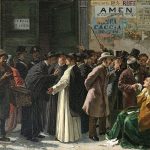Digital Citizenship
There is a social construction online that we call a place to live and work, to be counted as its citizens, for lack of a better word. Karen Mossberg defines #digital citizenship as “the ability to participate in society online.” The definition makes sense, but I need to make some qualifications. I will understand here not only a “society” but in the sense of participating also in a meta-society online. To participate means to have access and or Internet freedom for short. Ability means inclusion, (digital) human rights, and net neutrality.
But why speak of citizenship in reference to the Internet? Cyberspace has become a part of our social lives, it is a component of it just as education, social security or civil rights are, and moreover, it “has the potential to benefit society as a whole, and facilitate the membership of individuals within society” (Mossberg). As a means of being able to have a wider participation it is a social right and a part of citizenship as a whole, a right of membership in society. Digital citizenship puts the emphasis on the right of access to and skills for use of ICTs.
The basic idea of citizenship, the set of rights of membership in society, is to ensure that a people within a society has a legal framework for equality and justice. Citizenship is there to prevent exclusion in any of its forms: from political or civil rights, from voting rights or education. In the same manner, digital citizenship could be understood as a legal and regulatory framework to prevent digital exclusion: the fact that a large number of people are prevented from using ICTs because of economical, educational or social reasons. This is sometimes referred to as the “digital divide”.
“Your legal concepts of property, expression, identity, movement, and context do not apply to us”: Barlow proposes a Cyberspace where ethical self-regulation will guarantee a kind of freedom from government control. But first of all, we will need the real-world laws and regulations that empower and give the people the rights within a society to be able to access this new world.
Then we can begin to explore what are the consequences of a digital citizenship for Barlow’s world.
“A political society is not, and cannot be, an association. We do not enter it voluntarily” (Rawls). We enter citizenship not by choice. It is a system of social cohesion and mandatory for all. Therefore we expect that the political framework of citizenship ensures equality, human rights, social cooperation and reduces exclusion.
Social cooperation is regarded as having the elements for regulating social conduct, ensuring the fair terms of cooperation and of rational advantage: “then we can say without pretense and fakery that citizens are indeed free and equal” (Rawls).
Mossberg asserts that “digital citizenship encourages […] social inclusion”. In the same way that citizenship is not a choice, digital citizenship should not be optional. It is not a “nice to have”. The social agent must be able to ensure his rational advantage and prevent being subject to digital exclusion.
The Internet and cyberspace has in many cases been understood just as a private business, as in e-commerce. Or as an elitist “world of the mind”, in the words of Barlow, that may be accessed only by the chosen few that are able to understand its uniqueness, and that is not subject government control. But this is not right. The Internet is a social tool and the lack of regulation creates exclusion, which in turn leads to an unjust society, the very opposite of all cyber-utopias, Barlow’s included.





